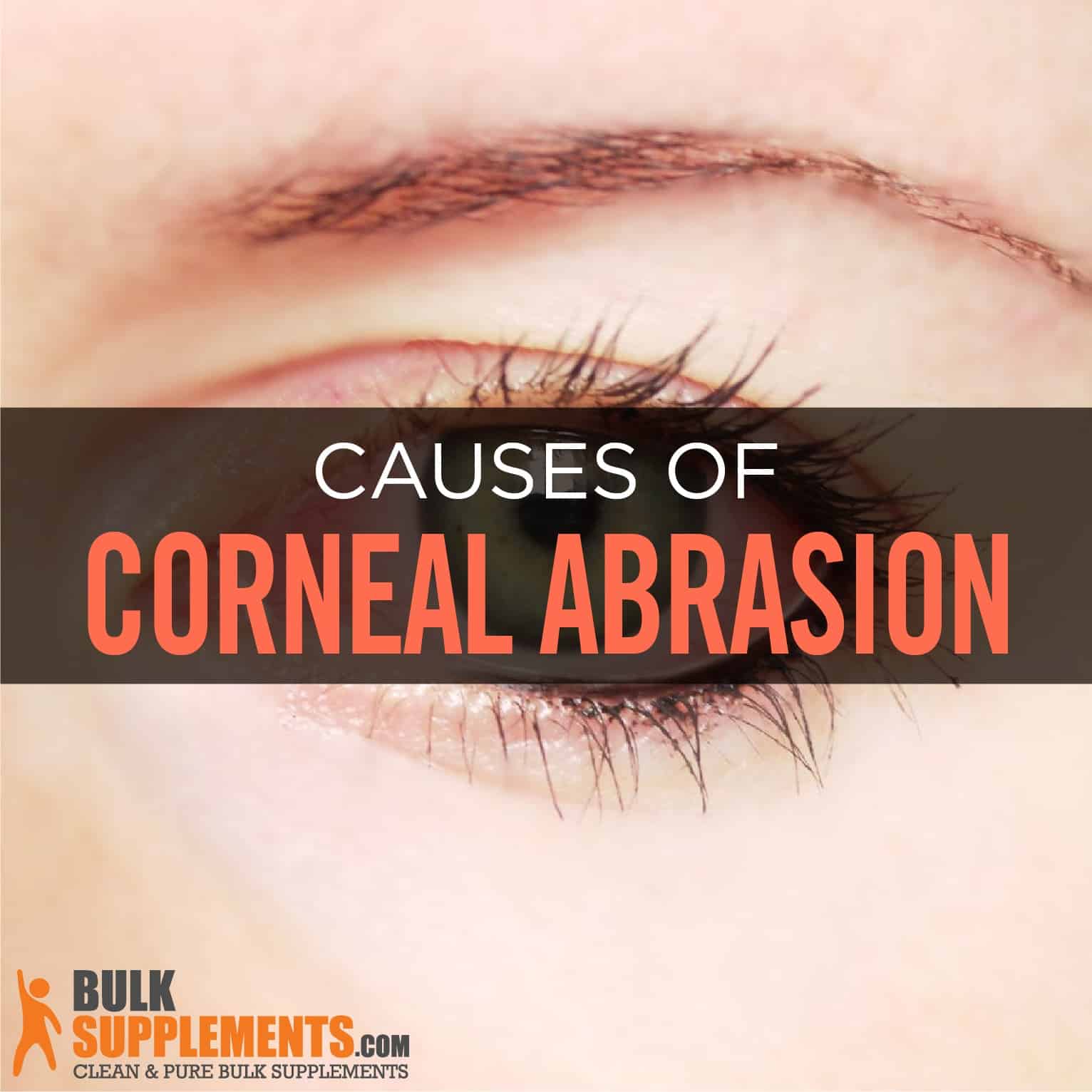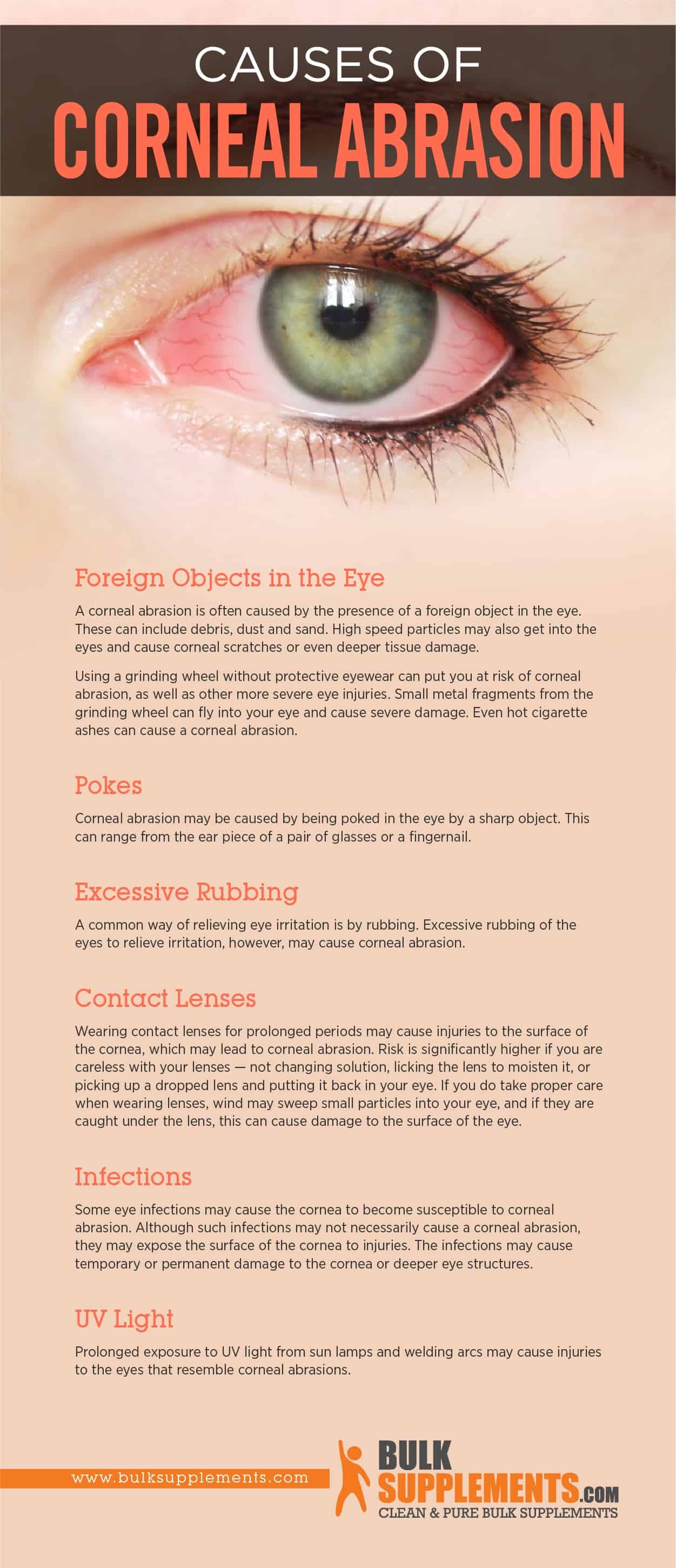Corneal Abrasion: Symptoms, Causes & Treatment
by James Denlinger Digital Marketing Strategist
What is Corneal Abrasion?
A corneal abrasion is the presence of a scratch on the eye. This condition usually occurs suddenly and may be caused by a range of traumas to the eye — anything from a poke in the eye to the presence of a grainy substance such as sand and dirt under the eyelid.
You should suspect corneal abrasion if your eye hurts and the pain does not go away when you shut it. In addition, exposure to light may cause a stinging or burning sensation in the eyes. As the name suggests, corneal abrasion usually affects the cornea, the part of the eye above the iris, which is the colored area of the eye.
The primary function of the cornea is to protect the pupil, which is the black circle located in the middle of the eye. Corneal abrasions are common eye injuries. However, when left untreated, it may lead to an eye infection, which can become severe. Therefore, consider seeing a doctor immediately if you suspect corneal abrasion.
Corneal Abrasion Symptoms
Eye Discomfort
A scratched cornea can cause significant discomfort in the eyes. Red eyes and heightened sensitivity to light accompanies the discomfort. The cornea is an extremely sensitive part of the body. Therefore, even the smallest corneal abrasions can be extremely painful and uncomfortable. The abrasion may feel larger than its actual size.
Other Symptoms
Apart from the discomfort caused by pain and the sensation of a gritty foreign object in the eye, patients may experience additional symptoms. Common symptoms of corneal abrasion include decreased vision, nausea, dull headache, increased sensitivity to light, redness of the eye, tearing and eye twitching.
Causes of Corneal Abrasion
Foreign Objects in the Eye
A corneal abrasion is often caused by the presence of a foreign object in the eye. These can include debris, dust and sand. High speed particles may also get into the eyes and cause corneal scratches or even deeper tissue damage.
Using a grinding wheel without protective eyewear can put you at risk of corneal abrasion, as well as other more severe eye injuries. Small metal fragments from the grinding wheel can fly into your eye and cause severe damage. Even hot cigarette ashes can cause a corneal abrasion.
Pokes
Corneal abrasion may be caused by being poked in the eye by a sharp object. This can range from the ear piece of a pair of glasses or a fingernail.
Excessive Rubbing
A common way of relieving eye irritation is by rubbing. Excessive rubbing of the eyes to relieve irritation, however, may cause corneal abrasion.
Contact Lenses
Wearing contact lenses (x) for prolonged periods may cause injuries to the surface of the cornea, which may lead to corneal abrasion. Risk is significantly higher if you are careless with your lenses — not changing solution, licking the lens to moisten it, or picking up a dropped lens and putting it back in your eye. If you do take proper care when wearing lenses, wind may sweep small particles into your eye, and if they are caught under the lens, this can cause damage to the surface of the eye.
Infections
Some eye infections may cause the cornea to become susceptible to corneal abrasion. Although such infections may not necessarily cause a corneal abrasion, they may expose the surface of the cornea to injuries. The infections may cause temporary or permanent damage to the cornea or deeper eye structures.
UV Light
Prolonged exposure to UV light from sun lamps and welding arcs may cause injuries to the eyes that resemble corneal abrasions.
Risk Factors
Some factors increase the likelihood of experiencing corneal abrasion. Using power tools without protective eyewear, outdoor activities, wearing contact lenses, facial trauma, disorders of the eyelids, and handling chemical solutions without protective eyewear increase the risk.

Diagnosis
Eye specialists diagnose corneal abrasion by applying eye drops to numb it for a physical exam. In addition, your physician may gently swab the eye for further analysis. This helps to determine the right treatment for the corneal abrasion, especially if the doctor suspects an infection.
When to Seek Medical Care
Seek urgent medical attention in case you experience:
- Sudden loss of vision or blurred vision
- Pain in the eyes
- Eye injury caused by a high-speed object
- You feel like something is in your eye but cannot get it out
- Pain in the eyes with exposure to sunlight or indoor lights
- Eye redness
- Heat or chemical burns in the eyes
- Recurring pain after treatment from an eye injury
What to Expect
Many people instinctively scratch their eyes whenever they feel like something is in them. However, scratching the eyes is not advisable because it can cause or worsen eye injuries. If you suspect the presence of dirt, dust or any other foreign objects in your eye, consider flushing it out with water instead of scratching your eye. Also avoid patching the eye because it expedites the growth of bacteria, which may infect the eye.
When rinsing your eye to rid it of irritants, consider using contact lens solution or saline eyewash instead of tap or bottled water. Microorganisms present in a tap or bottled water can cause serious infections to scratched cornea that may cause blindness or other eye complications.
Seek immediate medical attention in case you experience redness, pain or the presence of a foreign object in the eye. A corneal abrasion can quickly cause serious harm if left untreated.
Corneal Abrasion Remedies
Medical Treatment Options
The cause of the abrasion determines the treatment for corneal abrasion. Lubricating drops are usually recommended for the treatment of minor abrasions. The lubricating drops moisten the eyes and minimize pain to allow natural healing. Specific treatments may be recommended depending on the diagnosis.
Standard treatment for a corneal abrasion is antibiotic eye drops or ointment. Some eye specialists may prescribe steroid or non-steroidal anti-inflammatory eye drops to prevent inflammation and potential scarring.
Your doctor may also administer eye drops to stop muscle spasms. Such eye drops minimize pain and reduce sensitivity to light. On the downside, the eye drops may blur vision temporarily.
Tetanus vaccination may be prescribed in case your eye specialist finds the presence of metallic deposits in the injured eye. In addition, your ophthalmologist may administer anesthetic eye drops to relieve pain before, during or after an examination.
Your eye specialist may prescribe pain pills to be taken by mouth and recommend wearing sunglasses for pain relief due to heightened sensitivity to light. Many eye specialists would prescribe antibiotic eye drops even for superficial corneal abrasions to prevent infections and expedite healing.
Supplements for Corneal Abrasion
Chamomile
This product is rich in antioxidants and flavonoids that promote skin, heart, bone, teeth and gut health. Chamomile may also boost mood, improve sleep and minimize anxiety. The recommended healthy portion for this supplement is 800 milligrams taken not more than twice per day. Consider taking with lots of water to maximize absorption.
Chamomile Warnings
Avoid taking chamomile supplements if you are allergic to ragweed. Overdose may cause side effects such as drowsiness. Therefore, do not operate heavy machinery if you are supplementing with chamomile. In addition, pregnant mothers and nursing women should avoid taking chamomile supplements altogether.
Coconut oil
Coconut oil promotes skin and hair health. The product is rich in lauric acid that supports its absorption by hair shafts. Applying coconut oil on your skin before or after washing reduces protein loss from hair and skin.
The eyelashes contain microorganisms that may infect the eyebrow area and the eyes. Coconut oil has antimicrobial and antifungal properties that can protect the eye area from infection. To apply coconut oil with your fingers or hands:
- Wash your hands thoroughly
- Pour a small amount into the palm of your hand
- Gently dab the coconut oil along your eyelashes with your index finger
To apply coconut oil with mascara wand:
- Dip the mascara wand in coconut oil in a container
- Gently apply the oil to your eyelashes, as you would mascara
- Remove excess oil with cotton swabs
Colloidal Silver
Colloidal silver promotes skin and eye health when used in small quantities. This product has antimicrobial properties and is considered a possible treatment for acne. It can also be an effective topical wound treatment. Some eye drops contain colloidal silver because it aids in the prevention of conjunctivitis. However, the appropriate dosage for colloidal silver varies by age, health and other factors. Therefore, consult a nutritionist for a safe dosage for you. In addition, carefully follow the directions on colloidal product labels before using them.
Colloidal Silver Warnings
This product may affect fetal growth and is not recommended for pregnant women or women who want to conceive. Nursing mothers should also not use this product.
Corneal Abrasion Prevention
There are several tips for preventing corneal abrasions:
- Always wear protective eyewear in work environments with lots of airborne debris such as welding workstations. Consider using protective eyewear even when working on your lawn with power tools or playing sports.
- Follow the doctor’s instructions on how to wear contact lenses, how long to wear them, the right contact lens solution to use and proper disposal of the lenses.
- See an ophthalmologist for dry eye treatment in case you experience corneal abrasions caused by dry eyes.
The Bottom Line
Corneal abrasions are caused by scratches to the cornea, the clear part of the eye that protects the iris. This condition is often caused by the presence of foreign objects in the eyes. Common symptoms of corneal abrasion include a sensation of the presence of a gritty object in the eye and redness of the eyes. Corneal abrasions may be caused by dry eyes, foreign objects in the eye, pokes in the eyes, contact lenses, excessive rubbing and infections. Treatment is available for corneal abrasion, depending on the cause.
Sponsor Ads
Created on Mar 4th 2020 16:19. Viewed 324 times.



